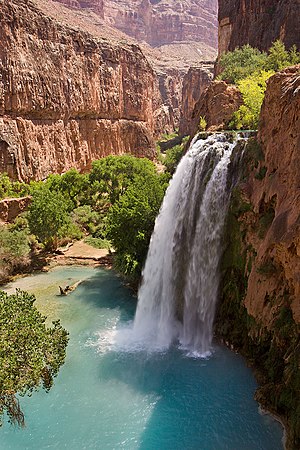Adventist Youth Honors Answer Book/Nature/Waterfalls
| Waterfalls | ||
|---|---|---|
| Nature North American Division |
Skill Level Unknown | 
|
| Year of Introduction: 2011 | ||
1. Define the following types of waterfalls and give one example of each.
[edit | edit source]In looking at waterfalls most often there can be different types represented in various stages of the fall. So you could have a plunge in the first 200m then a section of cascade for 30m vertical but 50m horizontal then a further plunge for 30m. A great example of this is the main waterfall in Yosemite National Park. This at my last look was the worlds 3rd highest.
These are the full list of waterfall types with brief descriptions but for the honour you only need to do those asked.
•Block: Water descends from a relatively wide stream or river.
•Cascade: Water descends a series of rock steps.
•Cataract: A large, powerful waterfall.
•Fan: Water spreads horizontally as it descends while remaining in contact with bedrock.
•Horsetail: Descending water maintains some contact with bedrock.
•Plunge: Water descends vertically, losing contact with the bedrock surface.
•Punchbowl: Water descends in a constricted form and then spreads out in a wider pool.
•Segmented: Distinctly separate flows of water form as it descends.
•Tiered: Water drops in a series of distinct steps or falls.
•Multi-step: A series of waterfalls one after another of roughly the same size each with its own sunken plunge pool.
a. Block
[edit | edit source]In a block waterfall, water descends from a relatively wide stream or river.
-
Agua Azul - Chiapas, Mexico
-
Millstream Falls - Queensland, Australia
-
Niagara Falls - Ontario, Canada
b. Cascade
[edit | edit source]In a cascade waterfall, water descends a series of rock steps.

Sutherland Falls is in Fiordland New Zealand. Trampers on the Milford Track usually can walk close to the falls base. NZers use to know this falls as the worlds third tallest falls, but now there is some debate over it.
c. Horsetail
[edit | edit source]In a horsetail waterfall, descending water maintains some contact with bedrock.
d. Plunge
[edit | edit source]In a plunge waterfall, water descends vertically, losing contact with the bedrock surface.

e. Segmented
[edit | edit source]In a segmented waterfall, distinctly separate flows of water form as it descends.
f. Tiered
[edit | edit source]In a tiered waterfall, water drops in a series of distinct steps or falls.

Purakanui falls. Catlins Southland New Zealand. This is a world famous falls visited by tourists from all over the world.
2. Choose 10 waterfalls, including 2 from near the area or state in which you live, and list the following information about them: Name, Total Height, Waterfall Type, Watercourse, Location.
[edit | edit source]3. Complete two of the following activities.
[edit | edit source]a. Visit a waterfall and write a paragraph telling about your experience.
[edit | edit source]There are numerous websites dedicated to helping you find waterfalls near you. Here are some:
- https://www.tripadvisor.com/ - search "waterfall" and enter your city or the city you want to search near.
- http://gowaterfalling.com/ - Mostly covers the Great Lakes region, but covers other areas as well.
- http://www.goby.com - You will have to enter some search terms to get data from this site. Try "waterfalls" for "What would you like to do" and then the name of your state or locality for "Where."
- http://www.newenglandwaterfalls.com/ - Covers New England.
If you know of more resources, please add them!
Be sure to follow the 7 Leave No Trace Principles when visiting any waterfall!
- Plan ahead and prepare.
- Travel and camp on durable surfaces.
- Dispose of waste properly.
- Leave what you find.
- Minimize campfire impacts (be careful with fire).
- Respect wildlife.
- Be considerate of other visitors.
b. Choose a waterfall (other than ones in #2) of interest to you and record facts and interesting information about the falls that you have selected.
[edit | edit source]c. Watch a video about a waterfall.
[edit | edit source]d. Make a scrapbook about waterfalls. Include pictures of waterfalls and important information about each one. This may be a group project.
[edit | edit source]e. Using the information provided, create a crossword or word search puzzle
[edit | edit source]- Angel/Tallest waterfall in the world at 3212 feet.
- Browne/Tallest waterfall in New Zealand.
- Dettifoss/Waterfall flowing from a glacier in Iceland.
- Havasu/Waterfall on an Indian reservation in Arizona.
- Huangguoshu/Largest waterfall in China.
- Iguazu/275 falls on the border of Argentina and Brazil.
- Langfoss/Giant cascade in Norway, falling 2008 feet.
- Mardalsfossen/Well known tiered waterfall in Norway.
- Multnomah/Tiered waterfall along the Columbia Gorge in Oregon.
- Niagara/Most powerful waterfall in North America.
- Shomyo/Tallest year-round falls in Japan.
- Takkakaw/Cree Indian name for a waterfall in British Columbia.
- Tugela/2nd tallest waterfall in the world, found in South Africa.
- Victoria/Largest waterfall in the world.
- Yosemite/Popular tourist attraction in a National Park in California.
- Yumbilla/5th tallest waterfall in the world, 2nd tallest in Peru.
4. Water is mentioned in each of the following verses. Describe what is happening in each verse, then tell what the water symbolizes.
[edit | edit source]a. John 9:11
[edit | edit source]b. John 13:5
[edit | edit source]c. Matthew 3:16
[edit | edit source]References
[edit | edit source]- Book:Adventist Youth Honors Answer Book/Honors
- Book:Adventist Youth Honors Answer Book
- Book:Adventist Youth Honors Answer Book/Skill Level Unknown
- Book:Adventist Youth Honors Answer Book/Honors Introduced in 2011
- Book:Adventist Youth Honors Answer Book/Nature
- Book:Adventist Youth Honors Answer Book/North American Division


